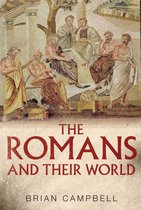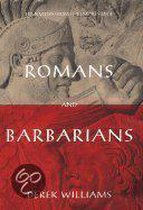The Barbarians Speak How the Conquered Peoples Shaped Roman Europe
Afbeeldingen
Sla de afbeeldingen overArtikel vergelijken
Auteur:
Peter S. Wells
- Engels
- Paperback
- 9780691089782
- 05 augustus 2001
- 352 pagina's
Samenvatting
Re-creates the story of Europe's indigenous people who were nearly stricken from historical memory even as they adopted and transformed aspects of Roman culture. This book shows that these societies did grow more cosmopolitan under Roman occupation, but that the people were much more than passive beneficiaries.
The Barbarians Speak re-creates the story of Europe's indigenous people who were nearly stricken from historical memory even as they adopted and transformed aspects of Roman culture. The Celts and Germans inhabiting temperate Europe before the arrival of the Romans left no written record of their lives and were often dismissed as "barbarians" by the Romans who conquered them. Accounts by Julius Caesar and a handful of other Roman and Greek writers would lead us to think that prior to contact with the Romans, European natives had much simpler political systems, smaller settlements, no evolving social identities, and that they practiced human sacrifice. A more accurate, sophisticated picture of the indigenous people emerges, however, from the archaeological remains of the Iron Age. Here Peter Wells brings together information that has belonged to the realm of specialists and enables the general reader to share in the excitement of rediscovering a "lost people." In so doing, he is the first to marshal material evidence in a broad-scale examination of the response by the Celts and Germans to the Roman presence in their lands. The recent discovery of large pre-Roman settlements throughout central and western Europe has only begun to show just how complex native European societies were before the conquest. Remnants of walls, bone fragments, pottery, jewelry, and coins tell much about such activities as farming, trade, and religious ritual in their communities; objects found at gravesites shed light on the richly varied lives of individuals. Wells explains that the presence--or absence--of Roman influence among these artifacts reveals a range of attitudes toward Rome at particular times, from enthusiastic acceptance among urban elites to creative resistance among rural inhabitants. In fascinating detail, Wells shows that these societies did grow more cosmopolitan under Roman occupation, but that the people were much more than passive beneficiaries; in many cases they helped determine the outcomes of Roman military and political initiatives. This book is at once a provocative, alternative reading of Roman history and a catalyst for overturning long-standing assumptions about nonliterate and indigenous societies.
The Barbarians Speak re-creates the story of Europe's indigenous people who were nearly stricken from historical memory even as they adopted and transformed aspects of Roman culture. The Celts and Germans inhabiting temperate Europe before the arrival of the Romans left no written record of their lives and were often dismissed as "barbarians" by the Romans who conquered them. Accounts by Julius Caesar and a handful of other Roman and Greek writers would lead us to think that prior to contact with the Romans, European natives had much simpler political systems, smaller settlements, no evolving social identities, and that they practiced human sacrifice. A more accurate, sophisticated picture of the indigenous people emerges, however, from the archaeological remains of the Iron Age. Here Peter Wells brings together information that has belonged to the realm of specialists and enables the general reader to share in the excitement of rediscovering a "lost people." In so doing, he is the first to marshal material evidence in a broad-scale examination of the response by the Celts and Germans to the Roman presence in their lands. The recent discovery of large pre-Roman settlements throughout central and western Europe has only begun to show just how complex native European societies were before the conquest. Remnants of walls, bone fragments, pottery, jewelry, and coins tell much about such activities as farming, trade, and religious ritual in their communities; objects found at gravesites shed light on the richly varied lives of individuals. Wells explains that the presence--or absence--of Roman influence among these artifacts reveals a range of attitudes toward Rome at particular times, from enthusiastic acceptance among urban elites to creative resistance among rural inhabitants. In fascinating detail, Wells shows that these societies did grow more cosmopolitan under Roman occupation, but that the people were much more than passive beneficiaries; in many cases they helped determine the outcomes of Roman military and political initiatives. This book is at once a provocative, alternative reading of Roman history and a catalyst for overturning long-standing assumptions about nonliterate and indigenous societies.
Productspecificaties
Wij vonden geen specificaties voor jouw zoekopdracht '{SEARCH}'.
Inhoud
- Taal
- en
- Bindwijze
- Paperback
- Oorspronkelijke releasedatum
- 05 augustus 2001
- Aantal pagina's
- 352
- Illustraties
- Nee
Betrokkenen
- Hoofdauteur
- Peter S. Wells
- Hoofduitgeverij
- Princeton University Press
Overige kenmerken
- Editie
- New edition
- Extra groot lettertype
- Nee
- Product breedte
- 152 mm
- Product hoogte
- 19 mm
- Product lengte
- 229 mm
- Studieboek
- Ja
- Verpakking breedte
- 156 mm
- Verpakking hoogte
- 27 mm
- Verpakking lengte
- 228 mm
- Verpakkingsgewicht
- 538 g
EAN
- EAN
- 9780691089782
Je vindt dit artikel in
Kies gewenste uitvoering
Kies je bindwijze
(3)
Prijsinformatie en bestellen
De prijs van dit product is 30 euro. Dit is een tweedehands product.Alleen tweedehands
Als nieuw
Als nieuw
Als nieuw
Uiterlijk 17 mei in huis
Verkoop door
Antiquariaat Hovingh
- Bestellen en betalen via bol
- Prijs inclusief verzendkosten, verstuurd door Antiquariaat Hovingh
- 30 dagen bedenktijd en gratis retourneren
Shop dit artikel
Rapporteer dit artikel
Je wilt melding doen van illegale inhoud over dit artikel:
- Ik wil melding doen als klant
- Ik wil melding doen als autoriteit of trusted flagger
- Ik wil melding doen als partner
- Ik wil melding doen als merkhouder
Geen klant, autoriteit, trusted flagger, merkhouder of partner? Gebruik dan onderstaande link om melding te doen.









